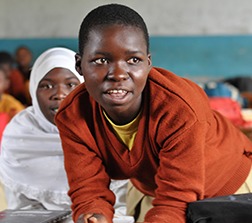- About
- Topics
- Picks
- Audio
- Story
- In-Depth
- Opinion
- News
- Donate
-
Signup for our newsletterOur Editors' Best Picks.Send
Read, Debate: Engage.
| August 11, 2015 | |
|---|---|
| topic: | Women's rights |
| tags: | #development, #education, #female education, #sanitary pads, #Sub-Saharan Africa, #women's rights |
| located: | Kenya |
| by: | Bob Koigi |
Sub Saharan Africa is one of the regions where women struggle with access to the sanitary pads, with a bulk of the women and girls, especially those from the rural areas and informal settlements, unable to afford to buy the conventional sanitary pads.
The situation is particularly bad among schoolgirls with one in every ten girls in Africa missing school during their menses and eventually dropping out.
In Kenya approximately 65 per cent of women and girls cannot access sanitary pads, with over 850,000 girls missing school as a result. A typical school going Kenyan girl misses 5 school days a month, totaling to 60 learning days a year. The cultural and social taboos associated with women and girls in their menstrual period further exacerbate the matter. Girls, especially those in rural and low income areas, turn to archaic methods to manage the menstrual flow, like using goat skin, mattresses, cow dung or dry leaves.
Barclay witnessed it first hand. As a final student at the University of Nairobi, where he was studying a degree in Commerce-Finance, he decided to volunteer as a teacher in a girls’ high school in a town dubbed Narok in the South Western part of Kenya.
He realized that at one point dozens of girls would be absent from school. On inquiring he learnt that it was customary in the school. Girls had to stay away during their periods because they couldn’t afford the conventional sanitary pads. Everyone seemed okay with that. “But I wasn’t. I couldn’t understand how any girl would miss school on such grounds. It was not only emotionally traumatizing for the girls but also stripping their dignity. I had to do something about it,” said Barclay.
With the little savings he had and a loan of $1500 from his parents, he set out to establish a business which would manufacture low cost and re-usable sanitary pads. He took time to learn about sanitary pads, the gaps and the market.Thus Impact Africa Industries was born.
Having been started in 2011, the company has now gone beyond Kenya in the supply of the sanitary pads to East Africa and now targeting the rest of Africa. Since inception, the company has already supplied over 1 million of the re-usable sanitary pads to girls across East Africa and reached more than 1,360 schools.
“The happiest moment in this journey was when the government gave me a clean bill of health and allowed me to go ahead with he project. I knew the challenge was on me, and I vowed I would make every school-going girl smile,” Barclay added.
His company has employed 34 members of staff, with 23 working full time and 11 on casual basis.
Women are the majority, making up 22 of the 34 staff.
The re-usable sanitary pads which he has trademarked as safi pads, Swahili for clean, sell at almost half the price of the conventional ones and are packed in two, four and six pairs . The beauty with them is that they can be washed and re used.
"When coming up with this idea, I thought hard about making low cost sanitary pads. But then again with priorities of the rural people being food what would guarantee that the small girl would get money to buy the pads the next month. I had to think of a pad that they would buy just once,” Barclay further added.
Safi pad are based on the technology of an absorbent patch which is mixed with cotton to make it comfortable for girls when wearing it and easier to wash. According to Barclay, the market was so thirsty for the re-usable sanitary pads that the first batch sold out within one week of being released to the market.
The world has not been blind to Barclay’s efforts. Last year he appeared in the prestigious Forbes list of 30 Under 30 Most Promising Young Entrepreneurs in Africa.
In 2013 he emerged among the finalists in the Anzisha prize, a pan-African award scheme that celebrates remarkable African entrepreneurs and sponsored by Mastercard Foundation and the African Leadership Academy.
By copying the embed code below, you agree to adhere to our republishing guidelines.
